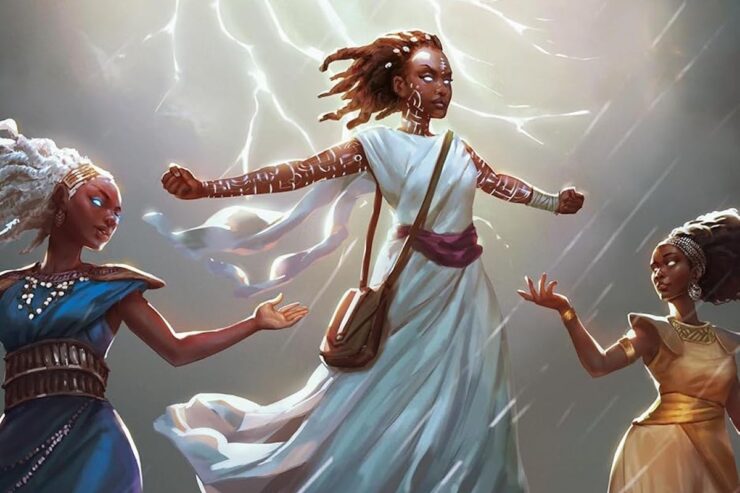West African deities are enjoying increasing popularity in pop culture. From Tomi Adeyemi’s Legacy of Orisha series to Rivers Solomon’s (et al.) The Deep, to Roy Okupe’s Iyanu: Child of Wonder, chances are you’ve come across popular Yoruba orisha like Shango, the god of thunder and fire and lightning; Yemoja, the goddess of the rivers and seas and fertility. One can argue for reasons behind this explosion: a surge in demand for fantastical tales beyond the usual diet; the increased visibility of West-African and diasporan authors on the global publishing stage. The fact remains that as humans we are endlessly fascinated with gods, be they powerful or neutered; be they aloof and mysterious or saddled with human characteristics that renders them relatable. Every single culture possesses gods in some form or the other. As a scholar of mythology, I remain fascinated with the various ways peoples the world over have created rich pantheons with similar godly counterparts—all with no cross-cultural pollination (I’m fairly certain the Vikings had no contact with sub-Saharan Yoruba peoples, and yet, Shango is a veritable counterpart to Thor.)
My own novella, In the Shadow of the Fall features some of these famous Yoruba deities. Shango, Yemoja and Eshu appear in all of their glory and folly. And yet, there are other gods you might not have heard of, gods equally delightful, and terrifying, and crafty. Gods you might not want to come across on a lone market road at night…
Below are five books which feature these gods.
Shigidi and the Brass Head of Obalufon by Wole Talabi
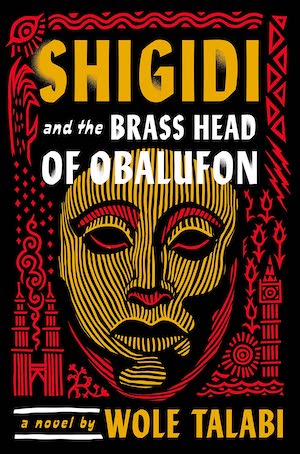
Shigidi is a malevolent spirit who is invoked by nefarious agents to do harm on the unwitting subject—to injure, drive mad, or even kill. In some regions of Yorubaland Shigidi is also a protective house spirit that shields against evil intentions. In Wole Talabi’s book he has very craftily imagined this spirit as a nightmare god who can be invoked to visit nightmares on unsuspecting victims. And though he is a god, he is saddled with human characteristics and emotions and wants. He is disgruntled with his lot in life and seeks to improve it, and he can, provided he reclaims an artefact for the scheming Olorun. Thus begins a fun heist caper that takes him and his lover Nneoma across continents. Gods from various pantheons feature aplenty. This book represents a brilliant examination of the concept of deities and what it means for them to exist in an increasingly irreverent world.
Skin of The Sea by Natasha Bowen
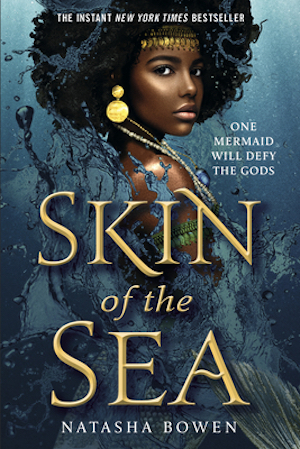
The concept of Mami Wata—a spirit who dwells in water bodies, akin to mermaid—is prevalent in eastern Nigeria. These spirits may or may not be benevolent. In Natasha Bowen’s book Simi is one of many such Mami Wata, collecting the souls of those who die at sea and blessing their journeys back home. Trouble comes when a boy is thrown overboard and Simi goes against her duty and sacred decree and saves his life.
To protect the other Mami Wata, and perhaps make amends for her transgressions, Simi journeys to the Supreme Creator. But all is not as it seems. There’s the boy she rescued, who knows more than he should. And something is shadowing Simi, something that would rather see her fail . . .
A brilliant and thrilling read for lovers of adventure and mythology.
David Mogo, Godhunter by Suyi Davies Okungbowa
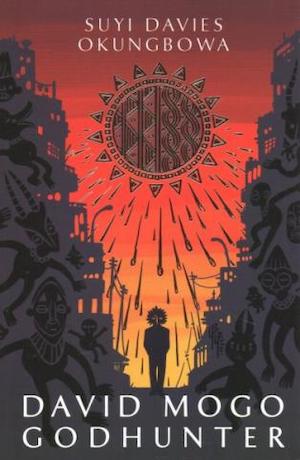
In Okungbowa’s powerful novel, gods have fallen from their perch in the heavens and settled in the city of Lagos. The titular character, David Mogo, is a demi-god and earns his bread solving supernatural problems for people, including, but not limited to, removing undesirable gods from neighborhoods, like some supernatural exterminator. Okungbowa, like Talabi, does not restrict himself to gods from one pantheon but draws on a host of gods from several ethnic groups in modern Nigeria, creating a rich but believable tale, for Lagos is cosmopolitan city, brimming with people from different walks of life, from every corner of the country. It makes sense that these various gods settle in this city.
Dazzling by Chịkọdịlị Emelụmadụ
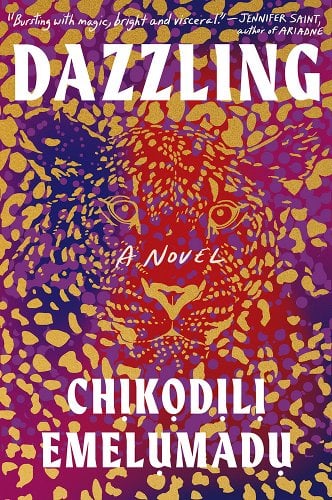
Dazzling artfully draws on Igbo mythology and cosmology to craft the tale of Ozeomena, who is chosen by a spirit as the first woman to be initiated into the magical Leopard Society. In this way she gains a connection to the goddess Idemili, goddess of the ocean of the Igbo peoples of southern Nigeria. The Igbo society was (and in some ways remains) largely patriarchal, and women were historically exempt from such secret societies, therefore this tale represents a powerful subversion by the talented Emelụmadụ; a reimagining of culture and society as so often speculative fiction allows us. It is also a fantastic illustration of modern Nigeria—the old and new world superimposed on each other. As in another famous Igbo novel, Things Fall Apart, Christianity and traditional beliefs are caught in constant fisticuffs.
The Black God’s Drums by P. Djeli Clark
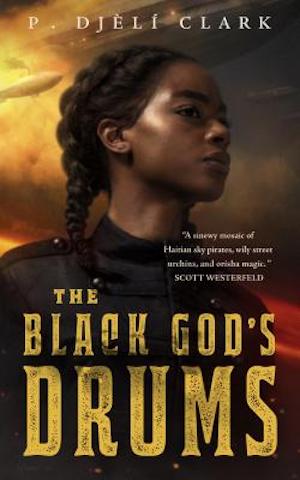
The brilliant P. Djeli Clark offers up a cocktail of Yoruba gods, trans-Atlantic slave trade, and the American civil war to deliver a tale. In classic Clark fashion, he renders a slightly off-kilter, alternate version of our world, but similarities abound aplenty. With the aid of some drums known as Shango’s Thunder, the Haitian Slave Revolt freed not only Haiti but many Caribbean nations, now called the Free Isles, by conjuring up storms to drown the French fleet. Now many years later Creeper, a thirteen-year-old urchin gifted (or cursed, depending how one looks at it) with the spirit of Oya, goddess of winds and storms, finds herself drawn into the middle of a plot by some Johnny Boys (Confederate wannabes) to unleash Shango’s Thunder on the free and neutral New Orleans. With the help of the pirate captain Ann-Marie St. Augustine (herself possessed with the spirit of Oshun, river goddess) and some helpful nuns she must race against time to stop the Johnny Boys. A slim novella, but it packs a punch. And shows the enduring tale of Africans in America, and the enduring ties (in the form of gods and religion) with the continent.
Buy the Book
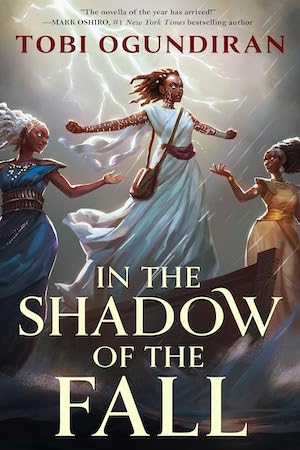

In the Shadow of the Fall










